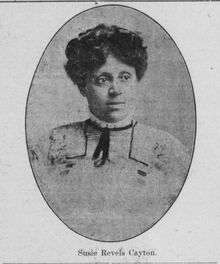Susie Revels Cayton
Susie Revels Cayton (1870 – 1943[1]) was a writer, editor, activist, and leader in the black community in Seattle at the start of the 20th century.[2]
Susie Revels Cayton | |
|---|---|
 | |
| Born | Susan Sumner Revels 1870 Mississippi, United States |
| Died | 1943 (aged 72–73) |
| Alma mater | Rust College |
| Occupation | Writer, activist |
| Spouse(s) | Horace Cayton Sr. |
| Children | Horace Cayton Jr., Revels Cayton |
| Parent(s) |
|
Biography
Early life
Susie Sumner Revels was born in Mississippi in 1870, the same year her father, Hiram Revels, became the first black senator in US history.[1] Revels' middle name "Sumner" was a tribute to the year Charles Sumner was sworn in as the Massachusetts senator when Revels was born.[3] Revels' father escorted C. Sumner at his swearing-in ceremony.
Revels graduated with honors from Rust College, teaching for three years, before returning to school to pursue a degree in nursing.[4][5]
Career as a writer, journalist, and editor
Revels met her future husband, Horace Cayton, in Mississippi and after a period of long distance letter writing,[4] later followed him to Seattle in 1896, where they were married in July of the same year. She began writing for his Seattle-based newspaper, The Seattle Republican, before departing Mississippi. She eventually became associate editor in 1900 and continued working at the paper until it folded in 1913.[4][1][6]
Revels and her husband started the newspaper Cayton's Weekly in 1916, targeted at a black readership. They promoted the great accomplishments and contributions of blacks as well as the atrocities committed against black members of the community. This paper ran until 1920 when it was replaced by Cayton's Monthly which only ran for two issues.[6]
In addition to her journalistic writing, Revels wrote short stories which appeared in The Seattle Republican, Cayton's Weekly, and the Seattle Post-Intelligencer.[7]
Economic downturn
In 1919, at the age of 49, Susie Revels Cayton was forced to seek employment as a "domestic" as the family experienced economic hardships.[8] Revels' interest in teaching was short-lived, but she later got involved in church and club related work in her community in Seattle.[9]
Late life
In her sixties, Revels became politically active and joined the Communist Party, after being introduced to the organization by her son, and was considered "one of the state's most prominent African American radicals".[4] She joined the communist party in reaction to depression-era Seattle, believing that only radical political change could address economic inequality.[8]
She became friends with activists Paul Robeson and Langston Hughes, and was admired by Richard Wright.[8] Langston Hughes dedicated a poem, Dear Mr. President, to her.[5]
Revels moved to Chicago in 1942, two years after her husband died, to be closer to her children. She continued advocating for progressive politics and communism to promote equality until she died in 1943.[8]
Charitable Work
Revels was a founding member and leader of a charity group called the Dorcas Club.[6]
Secretary, Skid Row Unemployed Council.[8]
Vice President, Negro Workers Council.[8]
Children
Susie Revels Cayton had four children with Horace Cayton Sr.: two sons, activists Horace Cayton, Jr. and Revels Cayton; their oldest daughter, Madge, who was one of the first African American women to graduate from the University of Washington; and daughter Lillie. Madge was a career social worker in her lifetime.[9] They also adopted their granddaughter, Susan, and raised her as their youngest child.[5]
Legacy
In 1992 the Cayton Scholarship was established to honor the contributions of these great Seattle journalists. This scholarship is available to minority college students in Washington state.[6]
Published works
External Links
Seattle Republican: Northwest Negro Progress Number published by H.R. Cayton and Susie Revels Cayton
References
- "Susie Sumner Revels Cayton Biography". www.notablebiographies.com. Retrieved 2019-01-13.
- "Cayton, Susie Revels (1870–1943) | The Black Past: Remembered and Reclaimed". blackpast.org. Retrieved 2019-01-13.
- Mumford, Esther (1980). Seattle's Black Victorians 1852-1901. Ananse Press. pp. 86–95.
- "Who's Who in Communist Party". depts.washington.edu. Retrieved 2019-02-28.
- McClain, Tiffany (October 24, 2002). "Heritage House". Chicago Reader.
- Tricia Martineau Wagner (2007). African American women of the Old West (1st ed.). Guilford, Conn.: TwoDot, an imprint of The Globe Pequot Press. ISBN 9780762739004. OCLC 70230638.
- "Susie Revels Cayton (1870-1943) • BlackPast". BlackPast. 2007-01-22. Retrieved 2019-02-28.
- Taylor, Quintard (1994). The forging of a black community : Seattle's Central District, from 1870 through the Civil Rights Era. University of Washington Press. ISBN 0295973153. OCLC 844198583.
- Schechter, Patricia. "The Cayton Legacy: An African American Family by Richard S. Hobbs (Review)". Oregon Historical Quarterly. 104 (2): 279–281 – via JSTOR.
- "Susie Revels Cayton: "The Part She Played" – Seattle Civil Rights and Labor History Project". depts.washington.edu.